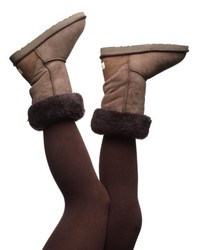
Counterfeits holding back UGG boot sales in China
Financial results show that increased competition from counterfeits is holding back efforts to grow sales of UGG boots inChina. The company behind UGG boots, Deckers Outdoor, now has 20 stores in China but its most established operations are suffering from the rise of fakes. Sales at its four established stores were down more than 10 per cent, in part because of increased competition from counterfeits. “We’ve had a lot of competition in the past year…in the form of counterfeits. That does represent a significant amount of competition,” Angel Martinez, CEO of Deckers Outdoor, said. Stemming the rise of counterfeit UGG boots is now central to growth plans, particularly outside the US.Martinez said this anti-counterfeiting focus has made the company “pretty good at addressing those issues and going after those folks.” Deckers Outdoor is using this experience to develop more cost-effective anti-counterfeiting methods, helping it control costs while tackling fakes.
Lear MoreScale of counterfeiting problem is revealed in new figures
The number of high risk suppliers to the US government, including companies that sold suspect counterfeit product to military and commercial electronics channels, increased dramatically by 63% from 2002 to 2011, according to market analyst IHS. “This large and growing trend highlights the need for members of all tiers of the supply chain to implement tighter supplier-monitoring and procurement procedures in order to meet increasingly stringent regulations,” said IHS. A total of 9,539 suppliers in 2011 were reported either for known involvement in high-risk, fraudulent and suspect counterfeit-part transactions, or for conduct identified by the government as grounds to debar, suspend or otherwise exclude from contract participation. In all, 78,217 potential high-risk firms and suppliers to US government agencies, defense contractors and subcontractors were reported during the period from 2002 to 2011. IHS has said that reports of counterfeit parts in the electronics supply chain quadrupled from 2009 to 2011.
Lear More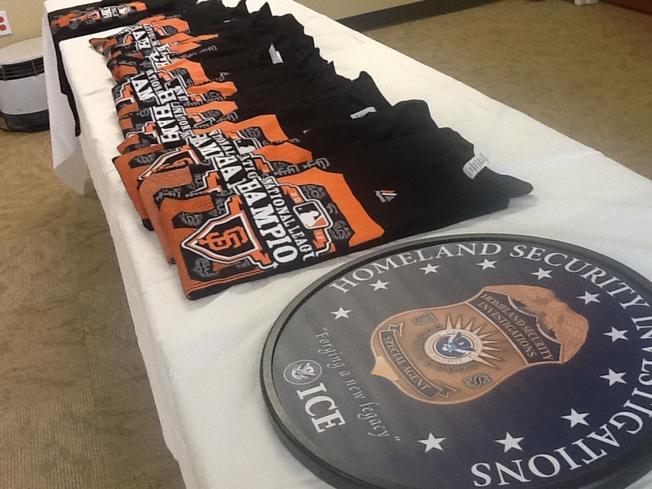
Feds Confiscate 1,200 Counterfeit MLB, Giants Paraphernalia
Federal agents announced Monday that their agency has confiscated about 1,200 hats, T-shirts and other Giants paraphernalia that they say are Major League Baseball counterfeit knockoffs. Had the goods been genuine, officials said they would have sold for more than $25,000. The U.S. Immigration and Customs Enforcement’s Homeland Security Investigations took these items during the first two World Series Games when the Giants played the Tigers at AT&T Park in San Francisco. Last year, intellectual property rights enforcement by HSI and U.S. Customs and Border Protection led to more than 24,000 seizures – a 24-percent increase compared to the previous year. The seized goods had a total value of more than $1.1 billion, based upon the manufacturer’s suggested retail price had the products been legitimate.
Lear MoreAFDAC’s new anti-counterfeiting strategies
The menace of counterfeit and substandard drugs, is no doubt one that has been on the front burner of national discourse as far as the safety of the health of Nigerians is concerned. This led to the setting up of the National Agency for Food and Drug Administration and Control (NAFDAC) by the Federal Government in 1993, with a clear mandate of safeguarding the health of the nation, through the provision of effective regulation of food, drug and chemical sector of the economy. While NAFDAC’s mandate covers the food and chemical industry, it is the drug market that draws the most attention, no doubt because of the pivotal role the sector plays in the health of the nation and because of the lucrativeness of the sector which makes it attractive to unscrupulous counterfeiters out to profit at the expense of the safety of Nigerians.Over the years, successive Directors-General of the Agency have come up with different strategies to curb the menace of fake drugs and each in his or her own way have helped to significantly address the problem working together with officers of the agency. According to studies conducted by NAFDAC from 2001 to 2012, there is a positive trend in the progressive decline in the incidence of counterfeit medicines in Nigeria. In 2001, counterfeits that stood at 40 per ent due largely to the indefatigable effort of the NAFDAC’s team, under the then Director-General, Prof. Dora Akunyuli, was reduced to 16.7 per cent in 2005. Shortly before she left the Agency, however, there were threats of resurgence of the incidence as counterfeiters too have not rested and have also continued to come up with novel ways of evading detection by NAFDAC and other law enforcement agencies. A study carried out in 2008 shortly before the arrival of the current Director-General of the agency, Dr. Paul Orhii, on the Quality of Anti- Malarials in Sub-Saharan Africa (QAMSA) puts the incidence of the faking of anti-malarial drugs at 64 per cent. This made the new DG to declare a zero tolerance war on counterfeits shortly after assuming office.It is in realisation of this fact that the current administration of Dr. Orhii came up with a strategy that is not just only effective but one that is also guaranteed to place the agency many steps ahead of the counterfeiters in such a way that every of their moves is anticipated, checked and thwarted by the agency. One such strategy is the introduction of cutting-edge technology that has provided a more profound method of detecting counterfeits on the spot. Technology like the TRUSCAN machine for example have been deployed by the agency at the ports and entry points of the nation to carry out on-the-spot check of drugs before they are cleared into the country. The Agency’s officers have gone to the 36 states of the federation and the FCT with the TRUSCAN machine, paying unscheduled visits to medicine outlets to fish out counterfeit drugs and destroy them. NAFDAC as the first medicine regulatory agency in the world ever to deploy the technology and its effectiveness in curbing the menace of fake drugs, has not only drawn the attention of international medicine regulatory agencies, but has also made the agency’s DG, Dr. Orhii the toast in the industry.
Lear More
“Fake in Italy” branches out into toothpaste, soaps-reports
Counterfeiters of the kind who normally concentrate on ripping off luxury labels are diversifying into cheaper daily items like soaps and shampoos to lure Italian consumers cutting back on everything amid the recession, a study on Monday said. Trademark counterfeiting generated 6.9 billion euros ($9 billion) in sales in Italy in 2010, with clothing, accessories and software as best-sellers, Rome-based think-tank Censis said. “The impact of counterfeiting on the economy is huge,” Censis said in a statement, adding that it cost 1.7 billion euros in missed tax revenues for Italy’s depleted state coffers. However demand for fake goods is expected to slow down this year as the crisis eats into family savings, Censis said. With Italians struggling under the impact of a year-long recession, tax rises, falling disposable incomes and rising unemployment, consumer spending is headed for its biggest post-World War Two decline this year. Growth in sales of counterfeit goods slowed to 19 percent at the peak of the crisis in 2009 from 37 percent in 2007, Censis said. Sales rose again in 2010 as the economy recovered. Although volumes may be falling, cheaper counterfeit products are gaining traction from demand for lower-priced goods, Censis said.Cosmetics are emerging as the fastest-growing category with sales of counterfeit lipsticks and pencils growing 15 times over the past decade, Italian cosmetic association UNIPRO said.Exports of food also face competition from a booming counterfeit industry offering products ranging from fake Parmesan cheese to spaghetti.Counterfeit Italian food generated sales of 1.1 billion euros in 2010, the third-biggest sector behind clothing and software, according to Censis.”This is a global fraud that must be stopped,” agriculture and food lobby group Coldiretti said in a separate statement.The renowned “Parmigiano Reggiano” cheese remains the most-copied product worldwide, Coldiretti said, with Brazilian “parmesao” adding to the list of dubious parmesan labels.
http://www.reuters.com/article/2012/10/22/italy-counterfeit-idUSL5E8LME0O20121022
Lear More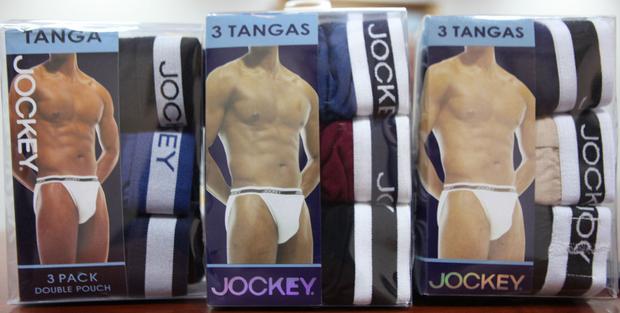
Clothing sector fights surge in counterfeit products entering South Africa
A steady increase in the number of street vendors selling counterfeit clothing around the country has led to job and revenue losses for clothing manufacturers, brand licensees and formal retailers, some of whom have now hired private investigators to deal with the problem.Both popular and expensive brands, usually associated with class and high quality, are at risk of being copied or sold as “rip-offs”. During the past financial year the SA Revenue Service (Sars) made 20 000 seizures of illegal goods to the value of almost R1 billion, including more than 750 000 pieces of clothing worth R483 million. Sars said undervalued imports posed a significant risk not only to the fiscus but to local industry and job creation. Adriaan Verhagen, the managing director of Ninian & Lester, the sole licensee of US underwear brand Jockey in South Africa, said this week that counterfeits had to be eradicated as they presented a major threat to local employment. Between 2007 and 2012, Ninian & Lester lost R20 million worth of sales to counterfeits. The company said this figure represented only 5 percent of the problem. It added that this amount could pay for 1 000 machinist jobs for 12 months. Verhagen said the company’s legal cases against counterfeiters had increased to 40 as a result of research done between 2007 and 2012. He said vendors sold fake Jockey socks for R5 a pair, whereas retail stores charged R22.95 for the authentic item.
Lear More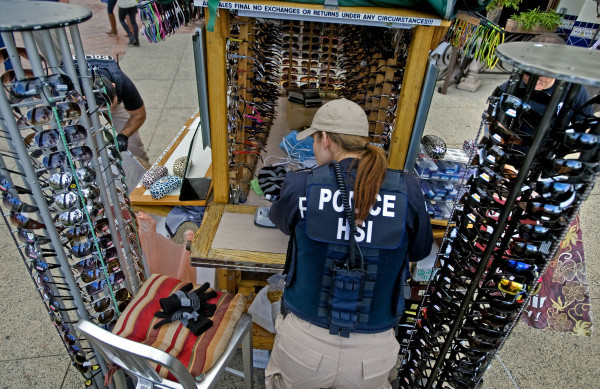
Police crack down on designer deceit in O.C.
As part of “Operation Fashion Faux Pas” the federal agents seized more than $200,000 worth of product this week in Orange County during a series of raids that capped a six-month crackdown on local makers of faux brand-name items. Though none of the vendors raided were arrested for hawking counterfeit merchandise, evidence was turned over to the Orange County District Attorney’s Office for possible criminal charges. The six-month effort in Orange County was one of the largest of its kind, and a Homeland Security Investigations official says it marks the start of a series of similar planned crackdowns on the growing crime of intellectual property theft. In fiscal 2011, federal authorities snagged $1.1 billion worth of fake goods, a 24 percent increase from the year before. The dollar figure refers to what the genuine products would have sold at retail. Overall, counterfeiting cost U.S. businesses up to $250 billion last year in lost revenue, according to the International Anti-Counterfeiting Coalition.”It is everywhere,” says Dan Showalter, supervisory special agent and group supervisor of Homeland Security Investigation’s fraud unit in Irvine. “Anyone can start their own counterfeit business with no overhead … The advent of technology and the Internet is driving this industry.”Counterfeiting isn’t just about money. Although handbags may not apply, many sham items pose safety and health hazards. Counterfeit batteries can blow up a child’s toy. Bogus pharmaceuticals can lead to sickness or worse. And urine is a popular product used for coloring in knockoff perfumes. Up to 80 percent of the counterfeit merchandise is manufactured in China and Hong Kong, federal authorities say. India and Pakistan are other hot spots for manufacturers and suppliers. Such items often wind up in a hot spot for fake product consumption.
http://www.ocregister.com/news/counterfeit-377983-agents-merchandise.html
Lear More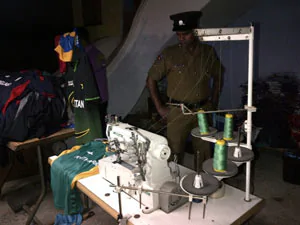
Sri Lanka raids fake ICC T20 clothing stores
Sri Lanka’s police raided a factory turning out counterfeit ICC World Twenty20 T-shirts and seized stocks of spurious merchandise. Deputy Inspector-General Anura Senanayake said they carried out the crackdown on fake World Twenty20 merchandise following a complaint from the International Cricket Council (ICC) over trade mark infringements. The ICC said local manufacturers were in the process of turning out “large quantities” of fake team shirts belonging to the 12 countries competing in the World Twenty20 tournament.
Lear More
3 individuals charged with trafficking in counterfeit goods in Florida
Three Florida men were charged in three separate indictments for trafficking in counterfeit goods. They face up to 10 years in federal prison and a fine up to $2 million. The cases were investigated by U.S. Immigration and Customs Enforcement’s (ICE) Homeland Security Investigations (HSI). Dale Borders, 38, of Orlando, is charged with trafficking in counterfeit DVDs bearing the trademarks of Beachbody LLC, Disney Enterprises Inc. and Zumba Fitness LLC. Gary T. Mannix, 59, of Daytona Beach, Fla., is charged with trafficking in counterfeit sports merchandise and National Football League, National Basketball Association, National Hockey League, National Collegiate Athletics Association and Major League Baseball jerseys. Mohamed El Said Mohamed, 37, of Ormond Beach, Fla. According to court documents, he admitted to trafficking more than 1,000 counterfeit handbags, jewelry, watches and wallets bearing trademarks of Coach, Fendi, Prada, Gucci and Louis Vuitton.
http://www.ice.gov/news/releases/1210/121011orlando.htm
Lear MoreGovernment to warn motorists about counterfeit air bags
The Obama administration is preparing to warn car owners whose air bags have been replaced in the past three years that dangerous counterfeit bags may have been installed, according to auto industry officials who have been briefed by the government. The National Highway Traffic Safety Administration alerted the industry in a series of telephone briefings on Tuesday that tens of thousands of car owners may be driving vehicles with counterfeit air bags. NHTSA testing has shown some of the counterfeit bags don’t inflate or fail to inflate properly. In at least one case, a counterfeit bag fired shards of plastic and other projectiles on impact. NHTSA will ask car owners to check a government website, Safercar.gov, or call their manufacturer or local dealership to learn if their vehicle model is among those for which counterfeit air bags have been made. The agency has compiled a draft list of dozens of vehicle makes and models for which counterfeit air bags may be available. NHTSA cautions at the top of the draft that the agency “expects this list to evolve over time”. If the car is on the list and has had its air bags replaced during the past three years by a repair shop other than a new car dealership, owners will be asked to bring the vehicle into a dealership to determine whether the replaced air bags are counterfeit.
A wide variety of counterfeit auto parts has long been a well-known problem, industry officials said. But recent incidents have escalated concern by government officials. In August, federal agents confiscated nearly 1,600 counterfeit air bags and arrested a North Carolina auto mechanic. Last February, Dai Zhensong, a Chinese citizen, pleaded guilty and was sentenced in federal court in Chattanooga, Tenn., to 37 months in prison for trafficking in counterfeit air bags. Zhensong was a part owner and manager of the international department of Guangzhou Auto Parts, which made a variety of auto parts, many of which were counterfeit, the statement said. In 2010, he traveled from China to Chattanooga to sell additional counterfeit air bags and other auto parts. The counterfeit air bags were manufactured by purchasing genuine auto air bags that were torn down and used to produce molds to manufacture the counterfeit bags. Trademark emblems were purchased through Honda, Toyota, Audi, BMW and other dealerships located in China and affixed to the counterfeit air bags. The air bags were advertised on the Guangzhou Auto Parts website and sold for approximately $50 to $70 each, far below the value of an authentic air bag.
Lear More



